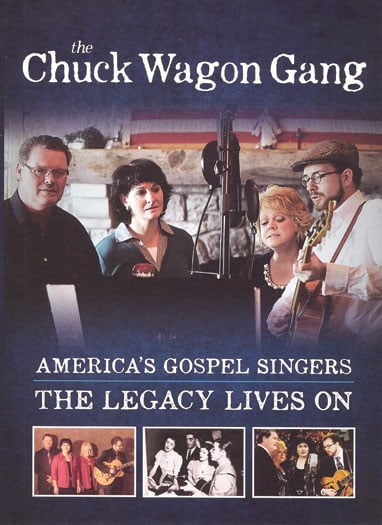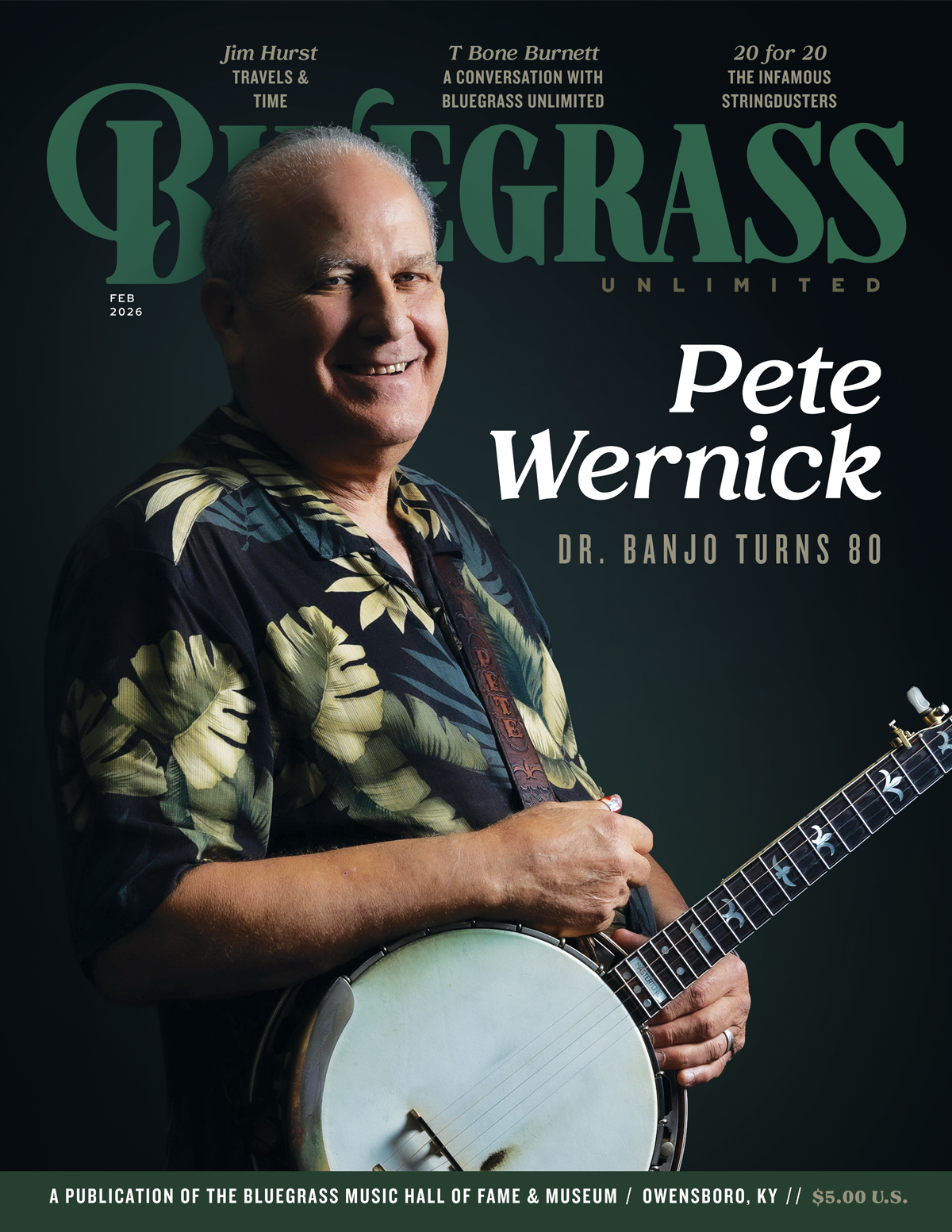THE CHUCK WAGON GANG AMERICA’S GOSPEL SINGERS
 THE CHUCK WAGON GANG AMERICA’S GOSPEL SINGERS:
THE CHUCK WAGON GANG AMERICA’S GOSPEL SINGERS:
THE LEGACY LIVES ON
New Haven Records
0270722811099DVD
Since the debut of the Chuck Wagon Gang’s Bear Family box set, along with the CD by the current group (see “Highlight Reviews” of both in the June 2015 issue of BU), I’ve been trying to recall when I first became aware of the CWG. They began recording when I was very small, so it was probably on Don Owens’ Radio Rodeo on WGAY in Silver Spring, Md., ca. 1948 that I first heard them at the age of about 14. Don was responsible for molding my taste in country music with his groundbreaking format. His preferences often became mine, including the music of the Chuck Wagon Gang.
To a lot of today’s generation, the name Chuck Wagon Gang may be familiar, but not much beyond that is actually known. This remarkable documentary, the brainchild of longtime CWG fan Marty Stuart (who was introduced to the band’s current members by WSM’s Eddie Stubbs) traces the 80-year history of the Texas Carter family (no relation to the Virginia Carter Family) from its beginnings during the Great Depression. Marty considers them “America’s musical royalty.” For the Carters, it was a grim hand-to-mouth existence in west Texas for a family of nine children, moving from place to place, laboring in the cotton fields and harvesting crops. About the only recreation was singing, which the family would do of an evening after supper; their first audiences were neighboring field hands. They would sing the old songs—country, cowboy, and gospel. Both parents had attended singing schools and would coach the children on church songs, teaching proper harmonies.
The sudden illness of one of the girls, Effie (who contracted pneumonia in 1935), compelled David Carter to try something to raise money for her medicine. He took two children, Ernest and Lola, to the local radio station, KFYO in Lubbock, Texas, and auditioned. The trio landed a 15-minute show and an advance of $12.50, their weekly salary. This paid for the medicine and during Effie’s convalescence, the group continued as a trio. When Effie recovered, she joined them and they became the Carter Quartet.
In 1936, they moved to WBAP in Ft. Worth, where they fortuitously inherited a program sponsored by a flour mill. The previous group, a Western string band, had been called the Chuck Wagon Gang, and the Carters inherited the name as well. As they had at KFYO, they quickly developed a strong following. Also at WBAP, another significant change took place; they assumed names, which their announcer Cy Leland felt were more pleasing. David became known as Dad, Ernest became Jim, Effie became Anna, and Lola became Rose. In November 1936, the CWG began recording for the American Recording Company and an assortment of labels that eventually evolved into Columbia Records. They would record for Columbia for the next 39 years, outselling (with forty million records) most of the other artists on the label. The initial 1936 session produced 22 titles, including parlor, cowboy, and early hillbilly titles, but it was their nine gospel songs that were the most enduring. “A Beautiful Life,” “Church In The Wildwood,” and “I’d Rather Have Jesus” were reissued over and over and still hold up wonderfully today. The next several sessions produced secular material, none of which is well-remembered.
By their 1940 session, they had emerged as a gospel group. The titles from this and the 1941 sessions saw such classics as “After The Sunrise,” “Lord Lead Me On,” “I’ve Found A Hiding Place,” “I’ll Be No Stranger There,” and “On The Jericho Road” committed to shellac. These and subsequent recordings heavily influenced many of the early bluegrass artists. Bill Monroe recorded titles from their repertoire, as did Jim & Jesse, Carl Story, and many others. Two artists I had the privilege to work with, Charlie and Dan Bailey, freely acknowledged a CWG influence with many of the gospel songs they performed. It was through Charlie Bailey’s recollections of hearing the CWG which finally made me realize just how important the quartet was, not only to bluegrass, but also to country music in general. In fact, no other gospel group had closer ties to country music of the 1930s through the 1960s than the Chuck Wagon Gang. Although “I’ll Fly Away” had been recorded by a few smaller groups before, the song’s composer Albert E. Brumley always acknowledged that the Chuck Wagon Gang were the ones who really put the song on the map with their 1948 Columbia recording. Longtime fans of bluegrass and country music will certainly recall the frequent airplay the CWG received on country radio stations.
Their fans were many, including such country luminaries as Merle Haggard, Charlie Daniels, Connie Smith, and Duane Allen of the Oak Ridge Boys. They are all present on the DVD, along with their recollections of hearing the CWG on the radio. Journalist Dan Rather, growing up in rural Texas back when times were tough, was a big fan who recalls their 15-minute broadcasts. According to Dan, “Radio was the magic carpet which took you places, and what the Chuck Wagon Gang did was take you to a higher and better and happier place.” Eddie Stubbs points out they were “America’s foremost country gospel singers” (with the emphasis on country.) They were never consciously part of the Southern gospel scene, eschewing pianos while preferring simple guitar accompaniment.
There are glimpses of the original CWG throughout the documentary, and portions of their best-remembered recorded triumphs are heard, emphasizing how much the current group (Shaye Smith, Julie Hudson, Stan Hill, and Jeremy Stephens) resembles the former. The DVD brings everything up to date with eight songs from their 2014 Meeting In Heaven release, which features songs Marty Stuart (who I consider to be a 21st century Albert E. Brumley) composed especially for the Chuck Wagon Gang and which incidentally they recorded the old way—live around one vintage ribbon mic without the use of headphones or overdubbing capabilities.
There is still a family connection to the original Chuck Wagon Gang, as alto singer Shaye Smith is the granddaughter of Anna and the great-granddaughter of Dad Carter. The original group certainly made their mark, and the current configuration of members is continuing that legacy not only by singing the old songs, but also by introducing new selections of tremendous substance that sound as if they could have been by the original group themselves. This is a gorgeous piece of American history and receives my heartiest recommendation. (New Haven Records, Dist. by Provident Music Group, 741 Cool Springs Blvd., Franklin, TN 37067, www.thep.com.)WVS
